#In regards to utena apologizing to anthy at the end
Explore tagged Tumblr posts
Text
God Tiers of Revolutionary Girl Utena: The Main Three

Masterpost | The Student Council | The Black Rose
Explanations and discussion below (spoilers ahead!)
Utena - Knight of Hope
Utena dons a mask of rebellion with her atypical uniform and participation in boys sports, but continues to dream of her own fairytale in her idolization of the prince. She wields Hope directly through the Sword of Dios (and later her own sowrd), and it is her convictions towards defending her friends and helping others that enable her to consistently prevail in the duels despite a lack of formal sword training. Even so, Utena frequently gets called out by others for her foolish naivety, and her "white knight" idealism can blind her to the real struggles and needs of the people around her. This is seen in her interactions with Juri regarding Shiori and especially in her duel with Wakaba, where Utena acts on the conviction that she is protecting her friend from a terrible fate without examining why Wakaba is upset or recognizing the problems her friend will return to. Utena also initially falls into the trap of viewing Anthy as a damsel for her to rescue and "play prince" to despite knowing very little about Anthy's situation, a failure which she eventually recognizes and apologizes for during their heart-to-heart on the roof. Through her tireless defense of the concept of a kinder world, even when faced with betrayal, Utena eventually achieves revolution by rejecting Akio's cruel definition of reality and equipping Anthy with the Hope needed to break free from her own coffin and change the world.
Anthy - Muse of Rage
An individual notable for both her severe passivity and subtle passive-aggressions, Anthy is the day-to-day orchestrator of the duels and the one who holds the power of revolution. She not only serves as the prize of the duels but cultivates the swords and roses that make the duels possible. It's been theorized that the titles of Muse and Lord are only granted to individuals trapped in extreme circumstances, and Anthy's role as the Rose Bride was certainly forced upon her, first the by world and then further upheld by Akio. She inspires ire in others often by simply existing in the same space, though she has skill in provocation too, and also harbors a lot of self-loathing towards herself and the machinations she plays a part in. Under the guise of Mamiya she directly uses the black roses to crystalize the victims' anger and negative emotions and turn them into duelists bent on destroying the system. It is through witnessing her suffering that young Utena is provoked to rage against Dios to help Anthy, and becomes driven to try to revolutionize the world. Rage can also represent the cold harshness of reality in contrast to Hope's fictional ideals, and Anthy often serves as the bitter pessimist to Utena's idealism. She seems to be aware of everything that occurs on campus, and seems to use her "witch" powers to alter reality on several occasions, from repairing the dorms to playing life lesson pranks on Nanami.
As Calliope's best ending in Homestuck came from deciding to live her own life, I believe the true challenge of the muse is to not fulfill their title and fully give themselves away, but to rather learn to use their aspect for their own desires. In Anthy's case, her journey is to to break free from perpetuating the harmful cycle around her and start building a reality for herself.
Akio - Prince of Time
The true Prince Charming become corrupted, and the representative "pinnacle" of masculinity in the world of Ohtori. Like all princes, Akio mirrors his opposite aspect Space in many ways: living in a planetarium surrounded by stars; identifying himself and others with various celestial bodies; his long hair and stylish fashion*; the ability to charm any woman; and his indulgence in hobbies like baking, photography, taking his car for nighttime spins, and a general penchant for hedonism. Even his secret pseudonym, "Ends of the World", is specifically indicated to refer to physical place rather than time. Yet we soon learn these are not true reflections of who Akio is: as he says himself, "the stars actually don't interest me at all". The planetarium only creates illusory spaces instead of reflecting real ones, and his car never traverses across any distance, merely driving in circles. Akio's revolution is not one of real change, but of endlesssly repeated cycles.
Akio's transformation and revolution are linked to the destruction of his fated destiny as prince, now relegated to the sleeping figure of Dios, and the subsequent effects of time, as he is the only character we witness become an adult. Despite his age he remains obsessed with chasing after his lost princehood, and goes so far as to destroy time's hold on himself, Anthy, and the rest of the academy in his quest for something timeless and eternal. This action serves to trap everyone involved in their own metaphorical coffins, locked in humanity's final destiny with no opportunity to live. He grooms the student council with promises of grand destinies and achieving "adulthood", promises he twists into tools of sexual abuse (and in Utena's case a way to destroy her perceived masculinity**) or vehicles for indoctrination into toxic concepts of patriarchy that the students then use to harm each other (Touga serving as his prime mentee and instigator). There's implications that Akio may have tampered with student's memories (especially Mikage and Utena) or merely gaslit them, warping and "destroying" their perceptions of the past. Akio's photography can also be viewed as a way of "freezing time", and photographs serve as important motivators for Miki, Juri, Nanami, and Mikage in their personal preoccupations with the past. His hookup with Tokiko, who's name contains the kanji for time, acts to sever Mikage's relationship with both her and time itself. The set-like nature of many of Utena's scenes draws to mind the stage curtains that Caliborn uses in Homestuck's later acts, and Akio's destructive nature is also reflected in how any part of campus not under Anthy's influence immediately falls to the ravages of time (Utena's delapidated dorm before moving in, and Nemuro Hall before and after the Black Rose arc).
*His jade hairpin also incidentally mirrors Jade Harley and the Space-inclined jadebloods.
**What's a name for someone who destroys masculinity in others? Call that a womaniz–*shot*
21 notes
·
View notes
Text
Duel Patterns
I’m procrastinating so hard I wrote long, rambly Utena meta.
Miki gets the most straightforward pattern to his duels.
Miki > Kozue with Miki’s sword > Miki and Kozue
Perhaps because of this it feels like he doesn’t really change much, though? His duels start and end with the same problem, and the final duel just plays it out. Miki is easily convinced to duel, but irresolute while duelling because he feels (…fairly enough, I suppose) that the duels make him impure, and doesn’t want to risk his own invincible innocence. Kozue is unable to resist acting out to get Miki’s attention, even when she knows it’s only making things worse. Kozue distracts him by making out with Anthy, Miki can’t keep going in the face of that, and acting at cross-purposes causes them to crash — Miki is hit by the car Kozue was in.
Juri’s duels would follow the same pattern, but the addition of Ruka spreads the final duel out over two, with Ruka and Shiori, and Ruka and Juri. It’s hard to say whether the pattern disruption helps or hinders Juri’s arc. Considering Ruka had to first manipulate and then bargain to get her to duel at all, it seems as if she might simply have made good on bowing out without his interference. Ultimately, she doesn’t wind up so far from where she started either. She wanted to either confess to Shiori or be free of her — by the end she’s still struggling with that, even with the locket gone.
The badminton game takes Juri and Miki into trying to let go and form new relationships (with Utena) instead, which is good. In the post-revolution sequences, though, it seems to be Kozue and Shiori who are finding themselves and changing their behaviour. Although perhaps Miki and Juri letting up helped with that.
Saionji and Touga have a different pattern. Their Black Rose duels are almost irrelevant (Touga’s especially). Saionji might have been sincerely grateful to Wakaba, but she doesn’t have anything like the hold on him Kozue and Shiori have on Miki and Juri. Wakaba and Keiko more bring out the theme of the Black Rose arc itself — people who feel like they’re nobodies reaching for those who are somebodies.
Outside the Black Rose arc Touga and Saionji often echo each other’s duels. In the first arc the first and last duels Utena fights are against Saionji and Touga, and both end with the other with the Sword of Dios and her with a broken sword. Both boys fight her twice, too. There’s also the “the Sword of Dios has no special powers”/“the Sword of Dios has special powers and you didn’t know about them” echo, as Touga reveals what he knew that Saionji didn’t.
There’s also the unscheduled trip to the arena, which isn’t really a duel, and definitely not part of Akio’s patterns (he went surprisingly easy on Touga for how near that came to revealing a few key things about the nature of the duelling arena) but in a way it’s the centre of Saionji and Touga’s arc in the first set of duels. For one thing it reveals their connection to Utena and how much her own formative experience was theirs too. Even if the part she remembers of it has become distorted into a fairytale by time and she no longer remembers it clearly enough to see herself in the despairing girl they couldn’t save.
For another it lays bare the worst of them. Saionji may say he loves Anthy, and even acknowledges that fighting to own her is probably not congruent with that, but he’s still going to do it in order to defeat Touga. However much he wants it to be about saving either Anthy or the girl in the coffin, in the end he’s reaching for his lost friendship and tries to grasp eternity rather than helping Anthy when she appears in a coffin.
Touga manipulates the whole thing, willing to get his former friend expelled in order further his own chances of winning Akio’s power. He’s also willing to throw himself in front of a sword for it — never let it be said Touga doesn’t risk himself for his own ambition.
Saionji and Touga’s final duels are even more mirrors, and they wind up mirroring Utena and Anthy in the final arc too.
Saionji’s duel doesn’t fit the new pattern, because it establishes it. He’s the only one of the duelists to go on without a bride. But that’s because this duel is establishing Anthy as Utena’s bride. Until now, Anthy’s been giving the Sword of Dios to Utena as she would to any other duelist, but, when it vanishes, Anthy — acting of her own will in direct opposition to Saionji having just been convinced she doesn’t have one — draws Utena’s. And does so with great tenderness. The shadow play about teamwork seems to be aimed both at Anthy and Utena — who now have to rely on their bond to fight — and the future duelists who will have to try to do the same.
Saionji also learns a few things this episode, but they seem to take a while to sink in. He goes back to duel feeling special because he’s been singled out for attention by End of the World and doesn’t yet know this is the new pattern, but his motives haven’t changed. (I appreciate Utena and Miki both being like “You’ve changed? How exactly?”) It seems to sink in later both that he wasn’t special and has been duped once again, and that Akio saving the girl in the coffin means Touga doesn’t have any special access to eternity either and being equal to him doesn’t require duelling.
Having ended Saionji’s motivation for duelling to catch up with Touga, Touga’s duel episode explains Touga’s motivation for duelling to gain Akio’s power. Intriguingly, Saionji — amazingly the voice of reason by this point — thinks becoming like Akio is a terrible idea. There’s been a chain of toxic masculinity with Saionji imitating Touga who is imitating Akio, but meeting the actual source seems to have soured Saionji on the whole thing. Not that it stops him being a jerk in many ways, but he’s found some chill.
Their duel seems to highlight their relationship as much as Anthy and Utena’s. Especially with a shot of Saionji’s eyes as he draws Touga’s sword that’s very similar to a shot of Anthy’s eyes during the duel with Saionji as she drew Utena’s. They can’t defeat Utena and Anthy — their relationship is still very new and in attacking from the motorbike they’re still trying to duel from a shoddy copy of Akio’s system. Their motivations are also… not great. Touga thinks he needs to own Utena to protect her — to be fair, a mistake Utena herself has made with regards to Anthy — and Saionji doesn’t have a problem with this logic so much as he believes the duels themselves are a no win game with any motivation at this point.
The juxtaposition where they’re in Akio’s room posing half-naked on his car while Miki and Juri play badminton with Utena is one of the creepier effects in a creepy series. Miki and Juri are finding a certain amount of freedom through Utena. Touga and Saionji, in spite of the fact that they’re rooting for Utena at this point, are stuck with Akio. (In some ways paralleling them with Anthy, who is still very much not free of his influence yet.)
And, while the Student Council splits in half along those lines, Nanami isn’t quite in either half. She attends the badminton game but doesn’t join it and, rather than asking Utena what she will do, tries to warn her off as Touga and Saionji do later. She knows more than Miki and Juri, and isn’t as tangled up in it as Touga and Saionji.
Nanami���s duels follow an in-between pattern too. Tsuwabuki’s Black Rose duel doesn’t really add to the pattern, but he’s not as detached from her as Wakaba and Keiko are from Saionji and Touga. The fact that his initial motivation was to be a big brother like Touga makes him, maybe, a bit of a stand in, which is relevant because Touga is central to Nanami’s two actual duels.
Looking at the pattern of Nanami’s own duels what I mostly get is… fuckery. Nanami gets the weirdest and most disturbing push into duelling of anyone, especially the second time. I think there are two reasons for this.
First she’s being manipulated in two, not entirely synchronised, ways. If you look at her first duel, it seems doubtful that Touga knew why Anthy gave him a kitten, or that it was part of getting Nanami to duel. I don’t think he knew where the blood type compatibility test was going at first, either. His first reaction is to ignore it until Nanami starts rambling about how it has to be wrong, because she and her parents get along so well, and then snap that he’s not interested. If he’d known where it was going, I think he’d have either encouraged her or discouraged her more thoroughly. Instead, he just doesn’t wanna hear it.
Second, Akio’s also manipulating Touga and it’s in Akio’s interest if he can be pushed to burn his own emotional connections to the ground. I think this ties into the first one, in that Touga may not have known where the blood type compatibility test had gone until Nanami told him she wasn’t coming home because he wasn’t really her brother. And that’s right in front of Akio, who Touga wants to impress with his coldness, meaning that any chance of him comforting her or picking anything but the most cruel and opportunistic response was right out.
The lengths to which Touga goes to make it more awful than it needed to be, including staging that conversation with Keiko, are on his own head though.
Both times Nanami ends up in tears. The first time Touga comforts her, seemingly more for Utena’s benefit than hers, and the second time he just ignores her. Neither time did he expect her to win or want her to.
Nanami’s ending is also the most ambiguous. Miki and Juri have found a way to carry on caring about the people they loved without it being an all consuming obsession. Touga and Saionji have each other, and there’s at least some hope in that for them. Nanami’s a little close and a little distant, making tea for the boys rather than interacting with them. Given that it’s been three months I sort of hope the fact that she’s interacting with Touga at all means there was one hell of an apology somewhere in there…
21 notes
·
View notes
Text
PART 1
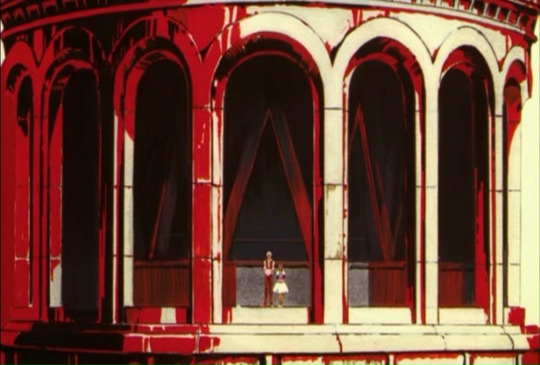
What’s this? A sister and her brother?
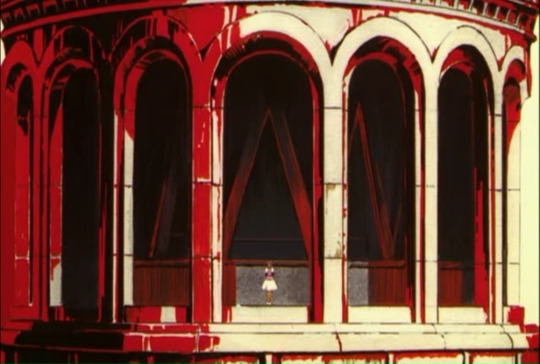
What’s this? A woman by herself?
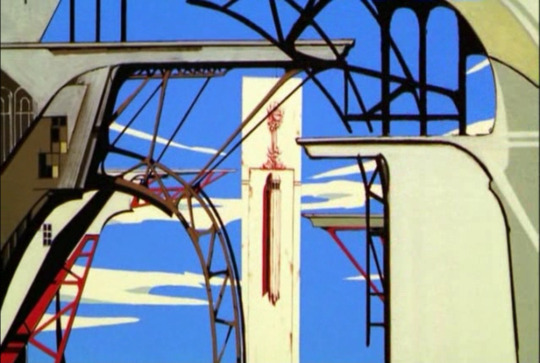
What’s this? The remains of the cock tower, bobbited, stuffed and mounted just beneath a rose, which has been nailed to a wall and is oozing architectural elements?
It can only mean one thing:
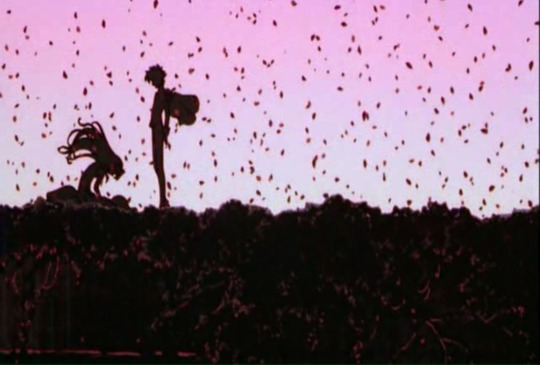
I’m a fountain of blood, in the shape of a girl
Yes, we’re doing this!
I should mention that we are doing this through a very specific lens, courtesy of tumblr user @snarp. The idea is: after leaving the academy, a jail with walls made of stories, Anthy would have had to come up with a way of reckoning with her own past which did not rely on those same stories for its structure. The Utena movie is her first attempt at retelling her own narrative in a way which is not completely overshadowed by her older brother. The more one looks for supporting evidence for this interpretation, the more one can find; so instead of focusing on whether this is a correct way of reading (a boring and ultimately fruitless question), let’s instead ask if this reading allows the movie to be good, which, by any number of more conventional metrics, it isn’t.
It makes sense right from the off, though. The first two images we see in this movie (beyond the carillon of school’s-out bells) are Anthy and Akio together and Anthy sans Akio, as if to say: we are removing this guy from the narrative, and good riddance. Then the opening credits consist of a montage of frustratingly tiny paintings:
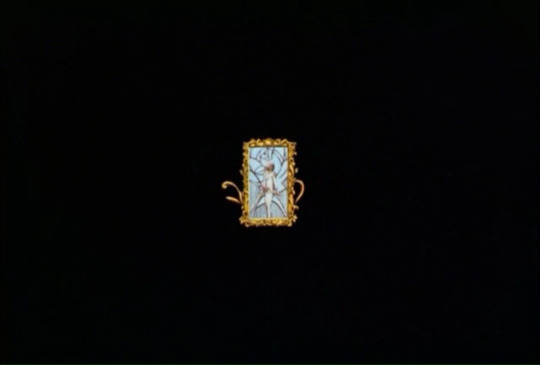
Paintings which, we learn later, are Anthy’s work. They appear, they confuse, and they disappear in a flash of fire; so we are led to understand that the coming narrative will be obscure, mercurial, and, most importantly, the product of a single perspective, that of our heroine. Who is in this film definitely Anthy, and not Utena.
Speaking of Utena – who is she in this iteration?
Well, she’s wearing a boy’s uniform, finally. It’s a striking one, as well – a kind of monochrome fool’s motley, which is a tough look to pull off by anyone’s standards, but she manages it. The duality of the black and white in her outfit represents her status in re the are you a boy or a girl situation: she is clearly being presented as the Two-Face of gender expression. She’s also immediately very gay.
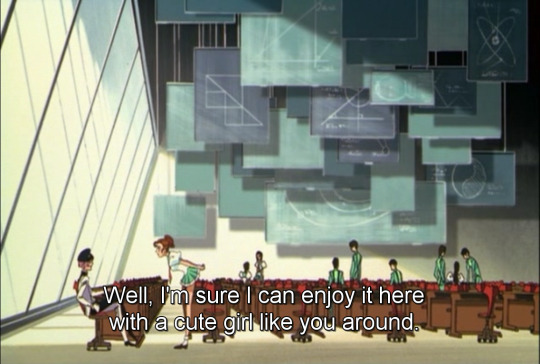
An immediate priority of the camera here (which we are going to persist in interpreting as Anthy’s camera, even if it kills us) is the demystification of sex. Utena and Wakaba are allowed to be flirty with each other without scandal or misunderstanding or censor roses or anything. Hidden desire and the sublimation thereof were the engine that powered the old academy system. They’re the first things up against the wall, so to speak, now that the revolution’s come.
We still have shadow puppet girls, though. Can’t shift ‘em. They’re like roaches.
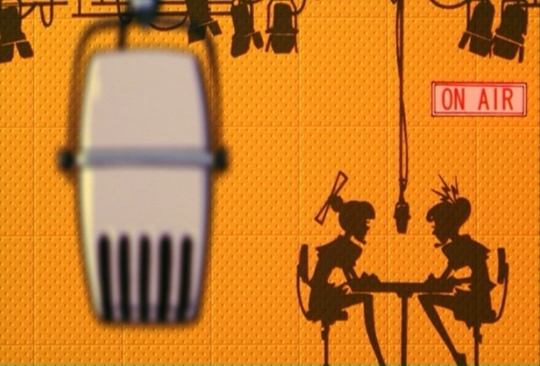
The camera angle here suggests that we are watching invisibly from a position just to the left of F-ko’s ear. It’s gonna take a second for Anthy to really get the hang of this artsy framing thing.
Utena and Wakaba stroll among the exploded architecture (a literal deconstruction of the old academy, ha ha ha) and meet the cast. Miki and Juri are largely as before, although Juri’s looking slightly more cheerful about things as she holds court from her throne, framed by busted Mondrians in stained glass.
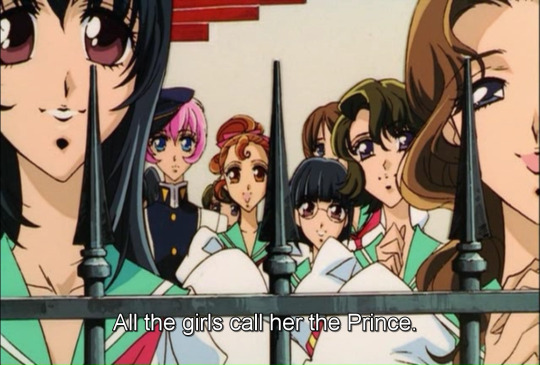
This may be because she’s absorbed a fair piece of Utena’s archetype, so Utena can be less initially invested in the whole cockamamie prince system. Wakaba suggests that Juri might be Utena’s rival – implicitly, as the other Big Gay On Campus. This is about as important as Wakaba gets. Rivals for Utena’s attention tend to get short shrift in this particular narrative - why would that be, one wonders? Speaking of which:
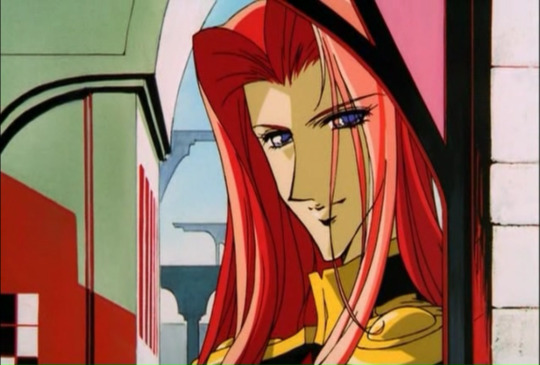
Sweet mary crackers, it’s Movie Touga.
Utena chases him and catches up at the rose garden (no longer a birdcage, no longer under glass). They’ve apparently known each other for some time. Utena warns him that she didn’t come to the academy to pursue him – she’s not the same person she used to be (i.e., kinda into girls now.)
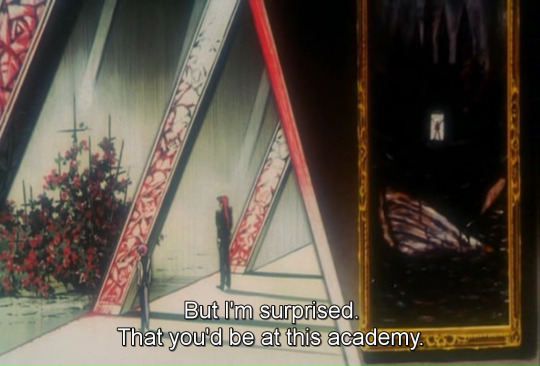
The camera pans back to reveal another of Anthy’s works, this one depicting a boat sinking while a distant prince looks on in horror. Anthy is manipulating the master narrative that Juri told the student council during the final duel, back in the real world; the one about the boy who drowned trying to save a girl and was forgotten. In the real world, the drowned boy turned out to be Utena. To get our happy ending, we’re going to have to shift things around a little.
Notably, Utena doesn’t recognize the ring he’s wearing. She has a prince thing – she decided, after she and Touga “broke up”, to live her life by higher ideals – but it’s not a Prince Thing. She has no connection to Akio. Nobody gave her a rose seal – until now, that is.
Touga vanishes. The rain stops. The walls retreat in a rush.
Dream logic brings Utena’s attention to a single white rose, which unfurls before her eyes petal by petal and deposits a glowing pearl in her hand, which turns out to be one of these.
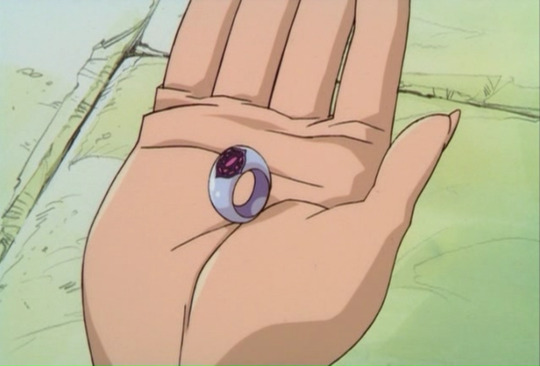
Regarding this sequence: it is important to point out that while the TV series liked to dabble in phallic imagery, we are going to have to dust off the word “yonic” for the movie. Funny that my spellchecker recognizes one and not the other.
We’re not done yet. As the ring nestles in her palm, a breeze picks up, carrying with it both the sound of bongos and a thick shower of crimson petals, which are swirling down from a suspended platform above. The platform makes the following shape in the sky:
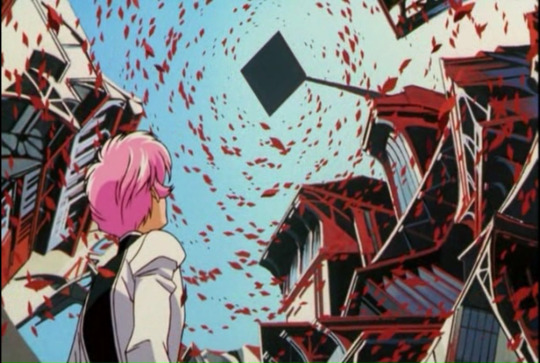
Yonic.
Utena goes up to investigate. It turns out the highest place in this academy isn’t a tower, it’s a rose garden [YONIC]; the architecturally dubious remains of the entrance gate tell us that it’s also the dueling arena, and thus the perfect place to meet our heroine.
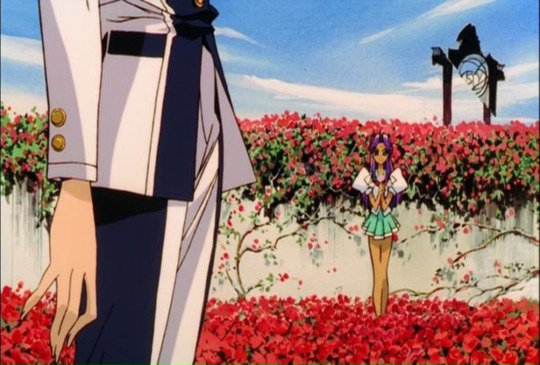
Movie Anthy wears her hair long. Movie Anthy never wore glasses. Movie Anthy makes the first move. Movie Anthy flirts. Also, perhaps most crucially, Movie Anthy does not withhold information.
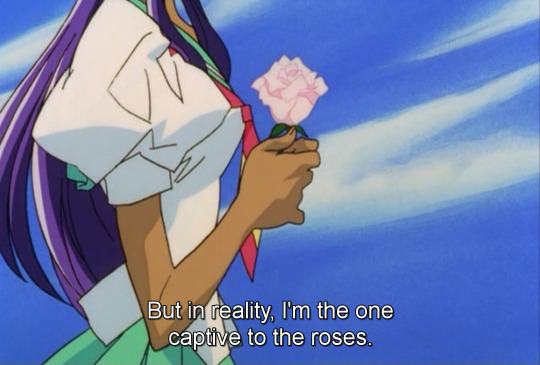
Movie Anthy is immediately all up in Utena’s business, and summons an anime breeze so that they can flap their hair at each other in a shower of rose petals. Then she sees the ring, and bang, no more breeze. Just like it was raining for the exact duration of Utena's conversation with Touga earlier on. Oh, is Anthy not the central figure of this story, the lens through which all of this is being observed? It’s not like her moods control the weather or anything
Appalled at the idea that this ultra-hot bab might be on the verge of dueling inveiglement, Anthy grabs Utena’s wrist and tries to wrestle the ring away from her. Utena flips the coin on her gender expression and it comes up dudes.
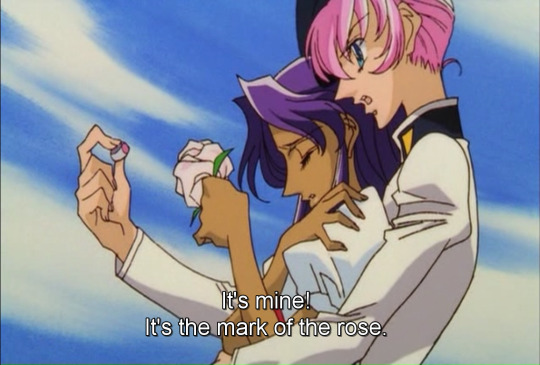
Then a cruel parody of Saionji shows up.
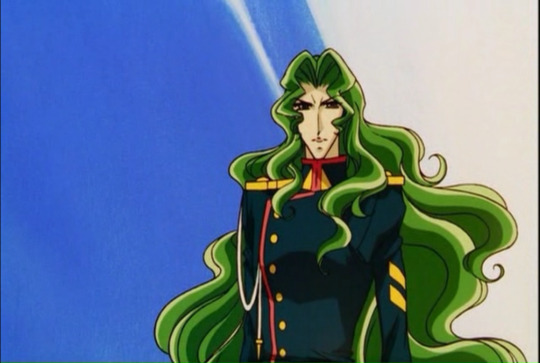
Woof.
The old academy and the new academy pretty much agree about this part of the story, except whatever lingering elements of dignity or relatability Saionji may once have had are now gone. He’s just a maniac with a sword, which makes sense, if Anthy’s telling the story.
Everything proceeds as expected til
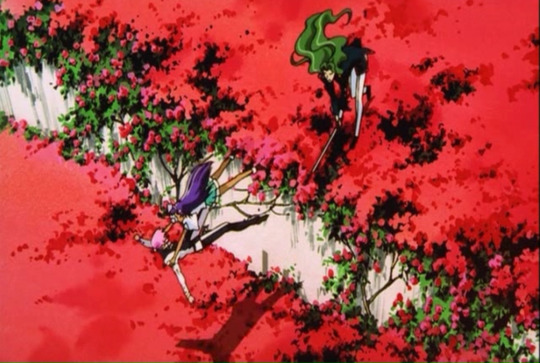
Whoops, the bride has agency!
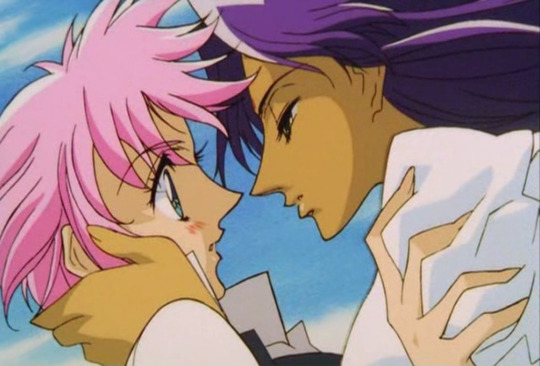
Woah, the bride has…agency
Full transformation ensues. The bride kisses Utena square on the lips, explodes into full regalia and produces her sword. Utena draws it, which tips her gender expression slightly further into true equilibrium, reuniting her with her fabled hot pants and epaulets combo and, most significantly, causing her to bust out in an all-time classic Princely Goop Mullet.
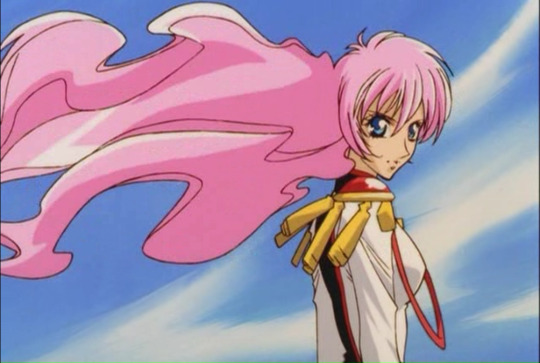
There is no excuse for this.
Saionji gets wrecked, immediately, and we’re out.
(Apologies for the lack of a borgesian dyad for this duel – the files I have don’t sub the chorale lyrics. Folks who have the full release should feel free to send in screenshots of worthy candidates.)
The first duel ends about twenty minutes into the movie’s runtime, which is handy. The rhythms of the old pattern are not so easily shaken. Maybe we’ll get a more thorough departure...
next time
#utena#utena liveblog#heeere we go#the background art and environment design in this thing is unimpeachable imo#so many lovely frames#shame about the character design#what is going on with their hands
187 notes
·
View notes